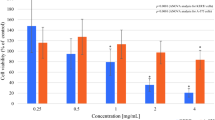Abstract
COLCHICINE and colchemid have been used extensively in vivo and in vitro as a means of halting cells at metaphase in order to make the counting of mitotic figures easier. It is generally assumed that both have a fairly specific action in this respect, although colchicine is considered to be more toxic to the whole animal than colchemid. Experiments were performed to determine whether colchicine and colchemid, at the concentrations normally used, had any direct and immediate action on the initiation and rate of DNA synthesis in guinea pig epidermal cells as measured by tritiated thymidine and autoradiography, since any such effect would alter the number of cells collected at metaphase.
This is a preview of subscription content, access via your institution
Access options
Subscribe to this journal
Receive 51 print issues and online access
$199.00 per year
only $3.90 per issue
Buy this article
- Purchase on Springer Link
- Instant access to full article PDF
Prices may be subject to local taxes which are calculated during checkout
Similar content being viewed by others
References
Hell, Elizabeth, and Cruickshank, C. N. D., Exp. Cell Res. (in the press).
Lajtha, L. G., J. Photograph Sci., 2, 130 (1954).
Author information
Authors and Affiliations
Rights and permissions
About this article
Cite this article
HELL, E., Cox, D. Effects of Colchicine and Colchemid on Synthesis of Deoxyribonucleic Acid in the Skin of the Guinea Pig's Ear in vitro. Nature 197, 287–288 (1963). https://doi.org/10.1038/197287a0
Issue Date:
DOI: https://doi.org/10.1038/197287a0
This article is cited by
-
Kinetic studies of the murine foetal thymus using vincristine sulphate
Virchows Archiv B Cell Pathology Including Molecular Pathology (1981)
-
Uptake of Amino Acids Into Pig Skin in Organ Culture and the Effect of Inhibitors of Respiration, Protein Biosynthesis and Tyrosinase*
Journal of Investigative Dermatology (1969)
-
Effects of Various Substances on DNA Synthesis in Guinea-pig Skin in vitro
Nature (1967)
-
Observations of the Binucleate Cells of the Liver
Nature (1966)
Comments
By submitting a comment you agree to abide by our Terms and Community Guidelines. If you find something abusive or that does not comply with our terms or guidelines please flag it as inappropriate.



